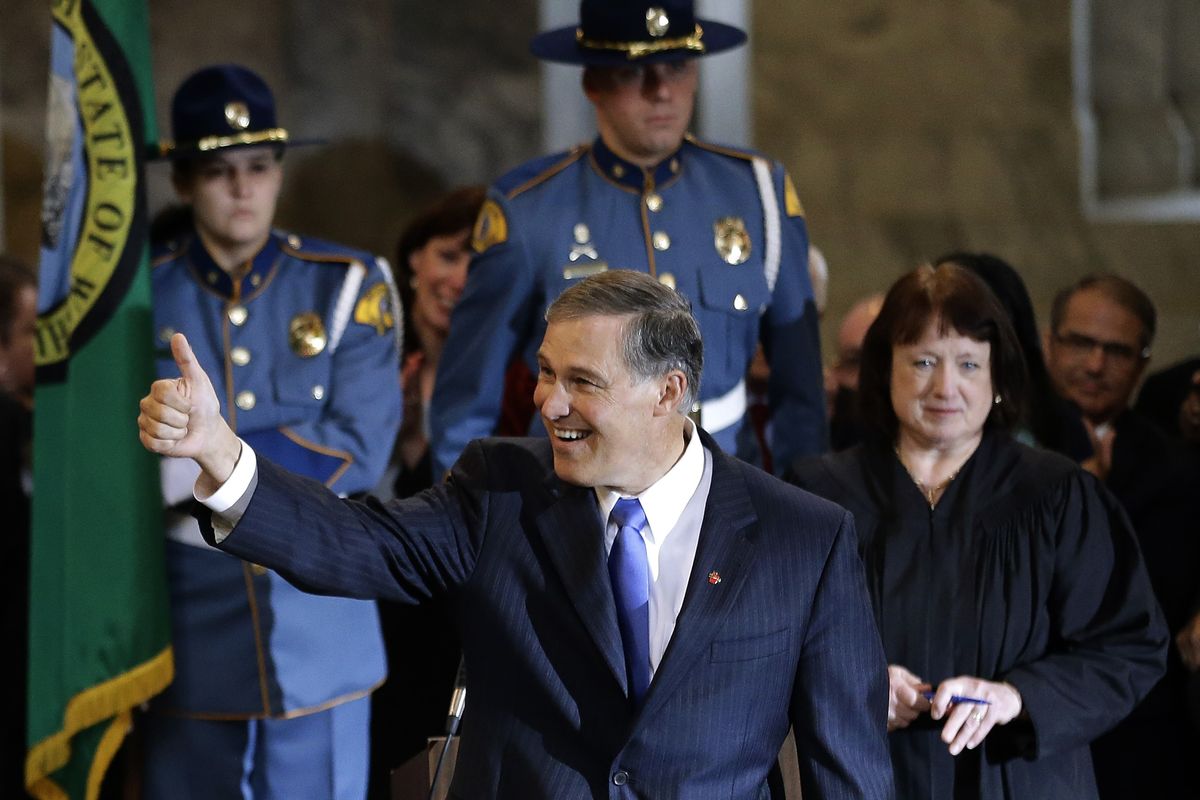New Washington state governor is sworn in

OLYMPIA – The first day of Jay Inslee’s governorship was marked by agreement that Washington needs more jobs but not more taxes,
and some disagreements over environmental and social issues.
In his inaugural address to a joint session of the Legislature, the newly sworn-in Inslee promised to lead an effort of “disruptive change” to get people in the state back to work.
“Our top priority today, tomorrow and every day for the next four years is jobs,” he said. “I will work with the Legislature to make it more desirable for small- and medium-sized businesses to hire more people.”
Republican legislative leaders said that was great but thought Inslee’s speech was lacking in details. They also aren’t too happy with his plans to focus on seven industry “clusters” – aerospace, life sciences, military, agriculture, information technology, clean energy technology and the maritime trades. That’s picking winners and losers instead of letting the market work, said House Republican Leader Richard DeBolt, of Chehalis, echoing the criticism of the Republican who Inslee beat for the office, Rob McKenna.
The road to a balanced budget that has all the money needed for public schools “runs directly through health care reform,” the new governor said. “Effectively implementing the Affordable Care Act will save us money by removing the hidden tax of hundreds of dollars paid by all our state’s insured citizens.”
But Republicans don’t like the Affordable Care Act – sometimes called Obamacare – and said they are skeptical of expanding Medicaid, even though the federal government will cover the cost of insuring more low-income residents for five years.
“We have to think long-term,” said Sen. Linda Evans Parlette, of Wenatchee. After five years, the state would have to pay 10 percent of those costs.
Although they criticized much of Inslee’s speech as too vague, Republicans also took issue with some of his specific points. On health care, Inslee called for the Legislature to approve the Reproductive Parity Act, which would require any insurance company that covers births to also cover abortions.
“Washington women need the freedom and privacy to make the health care decisions that are best for themselves and their families,” he said, drawing cheers from Democrats in the chamber but general silence from Republicans.
That’s a politically divisive issue, DeBolt said later. “Social issues right now are not as important as getting people back to work.”
Inslee said he wanted to make Washington the leader in clean energy to battle global climate change: “We have settled the scientific controversy. What remains is how we respond to the challenge.”
That brought more cheers from Democrats, but some Republicans shook their heads and others remained silent. DeBolt said later he doesn’t think the science is settled on the causes of global climate change. “If you want to say it’s an opinion, that’s fine,” he said.
The state’s focus should be on affordable energy, said Republican Senate leader Mark Schoesler, of Ritzville.
“We have very clean energy; it’s called hydropower,” Schoesler said. “It’s some of the most affordable energy in the U.S., and keeping it affordable is a big priority.”
Inslee said he wanted to work with the Legislature to address “a lethal combination of untreated mental illness, evil intent and easy access to deadly weapons.”
“I don’t have all the answers, but I know the sooner we reject the extremes and embrace common sense, the sooner we’ll be able to get a public health solution to this public health problem,” he said.
Republicans said they’d wait to see the details of any plan from Inslee, but thought addressing problems with care for the mentally ill was more pressing than any type of gun control.
Rep. Kevin Parker, of Spokane, who gave the GOP response to Inslee on television, said Republicans have a simple recipe for the session that started Monday: Make education the state’s first priority, support public safety and protect the most vulnerable without raising taxes.
“We must return to the principle that a strong economy makes a strong government, not the other way around,” Parker said.